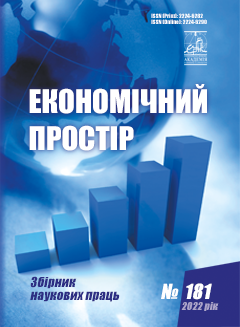ДЕТЕРМІНАНТИ КОМПЕТЕНТНОЇ ОРГАНІЗАЦІЇ
Анотація
Намагаючись розробити дієвий алгоритм побудови компетентної організації, здатної ефективно функціонувати у непередбачуваних умовах, науковці орієнтуються на обґрунтування необхідності підвищення рівня знань працівників, розширення їх вмінь та навичок, розвиток професійних якостей, наполягаючи, що ці чинники є ключовими у цьому процесі. З’ясовуючи, що є основою компетентної організації, підтверджуючи зростання ролі компетенцій та компетентності в управлінні організаціями, вчені не припиняють науковий пошук щодо єдиного розуміння сутності та змісту понять, адже єдиної думки щодо їх визначення немає. Це зумовило формулювання мети статті, що полягає у визначенні основних детермінант компетентної організації, дослідженні їх сутності, змісту, відмінностей у трактуванні та застосуванні понять.
Посилання
Малыгина О.В. Модель компетентности организации как инструмент оценки инновационного развития. Интернет-журнал «Науковедение». 2014. № 6. URL : http://dx.doi.org/10.15862/108EVN614 (дата звернення: 15.08.2022).
Економіка підприємства: компетентність і ефективність розвитку : монографія / В.С. Пономаренко та ін. ; за ред. В.С. Пономаренка. Харків : ХНЕУ, 2013. 176 с.
Хамел Г., Прахалад К. Ключевая компетенция корпорации. Вестник СПбГУ. 2003. № 3. С. 18–41.
Inkinen H. Intellectual capital, knowledge management practices and firm performance : thesis for the degree of Doctor of Science. Finland : Lappeenranta University of Technology, 2016. 125 p. URL : http://www.doria.fi/handle/10024/123376 (дата звернення: 20.10.2022).
Верба В.А., Гребешкова О. М. Проблеми ідентифікації компетенцій підприємства. Проблеми науки. 2004. № 7. С. 23–28.
Бояцис Р. Компетентный менеджер. Модель эффективной работы. Москва : HIPPO, 2008. 340 с.
Drejer A., Riis J. Competence development and technology. The International Journal of Technovation. 1999. vol. 19. pр. 631–644.
Наливайко А.П. Теорія стратегії підприємства. Сучасний стан та напрямки розвитку : монографія. Київ : КНЕУ, 2001. 227 с.
Алхимия компетенции. Стратегическая гибкость. Менеджмент в условиях нестабильности / Дюран Т. та ін. СПб. : «Питер», 2005. 384 с.
Александрова С.А. Комунікативна компетентність як професійно значуща якість фахівців туристської індустрії. Педагогіка та психологія формування творчої особистості : проблеми і пошук : збірник наукових праць ЗІДМУ. 2011. Вип. 42. С. 16–21.
Гребешкова О.М. Потенціал зовнішнього зростання підприємства. Стратегія економічного розвитку України : збірник наукових праць КНЕУ. 2003. Вип. 14. С. 32–38.
Гуияр Ф. Ж., Келли Дж. Н. Преобразование организации / Ф. Ж. Гуияр, ; пер. с англ. Москва : Дело, 2000. 376 с.
Hamel G., Prahalad C. Competing for the Future : Breakthrough Strategies for Seizing Control of Your Industry and Creating Markets of Tomorrow. Boston : Harvard Business School Press, 1994. 220 р.
Плоха О. Б. Теоретичні аспекти формування компетенцій в організаціях. Економіка розвитку. 2010. № 1(53). С. 47–50.
Malihyna O.V. (2014) Model kompetentnosty orhanyzatsyy kak ynstrument otsenky ynnovatsyonnoho razvytyia [Organisational competence model as a tool for assessing innovation development]. Ynternet-zhurnal «Naukovedenye» [Naukovedenie online journal] (electronic journal), no. 6. Available at: http://dx.doi.org/10.15862/108EVN614 (accessed 15 August 2022).
Ponomarenko V.S. (ed.) (2013) Ekonomika pidpryiemstva: kompetentnist i efektyvnist rozvytku : monohrafiia [Enterprise economics: competence and development efficiency : monograph]. Kharkiv : KhNEU, 176 p. (in Ukrainian)
Khamel H., Prakhalad K. (2003) Kliuchevaia kompetentsyia korporatsyy [A core competence of the corporation]. Bulletin of SPbSU, no. 3. pp. 18–41.
Inkinen H. (2016) Intellectual capital, knowledge management practices and firm performance (thesis for the degree of Doctor of Science). Finland : Lappeenranta University of Technology, 125 p.
Verba V.A., Hrebeshkova O. M. (2004) Problemy identyfikatsii kompetentsii pidpryiemstva [Problems of identification of enterprise competencies]. Problems of Science, no. 7. pp. 23–28.
Boiatsys R. (2008) Kompetentnii menedzher. Model effektyvnoi raboti [Competent manager. A model of effective work]. Moskva : HIPPO. (in Russian)
Drejer A., Riis J. (1999) Competence development and technology. The International Journal of Technovation, vol. 19. pр. 631–644.
Nalyvaiko A.P. (2001) Teoriia stratehii pidpryiemstva. Suchasnyi stan ta napriamky rozvytku: monohrafiia [Theory of enterprise strategy. Current state and directions of development: monograph]. Kyiv : KNEU, 227 p. (in Ukrainian)
Diuran T. ta in. (2005) Alkhymyia kompetentsyy. Stratehycheskaia hybkost. Menedzhment v uslovyiakh nestabylnosty [The alchemy of competence. Strategic flexibility. Management in an unstable environment]. SPb. : «Pyter», 384 p. (in Russian)
Aleksandrova S.A. (2011) Komunikatyvna kompetentnist yak profesiino znachushcha yakist fakhivtsiv turystskoi industrii [Communicative competence as a professionally significant quality of tourism industry specialists]. Pedagogy and psychology of creative personality formation : problems and search : collection of scientific works of ZISMM, vol. 42. pp. 16–21.
Hrebeshkova O.M. (2003) Potentsial zovnishnoho zrostannia pidpryiemstva [The potential of external growth of the enterprise]. Strategy of economic development of Ukraine: a collection of scientific papers, vol. 14. pp. 32–38.
Huyiar F. Zh., Kelly Dzh. N. (2000) Preobrazovanye orhanyzatsyy [Transformation of the organization]. Moskva : Delo, 376 p. (in Russian)
Hamel G., Prahalad C. (1994) Competing for the Future : Breakthrough Strategies for Seizing Control of Your Industry and Creating Markets of Tomorrow. Boston : Harvard Business School Press.
Plokha O.B. (2010) Teoretychni aspekty formuvannia kompetentsii v orhanizatsiiakh [Theoretical aspects of competence formation in organizations]. Economics of development, no. 1(53). pp. 47–50.



